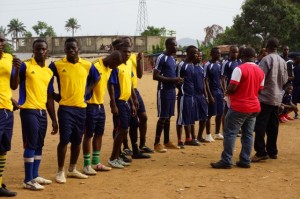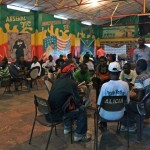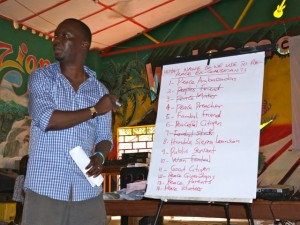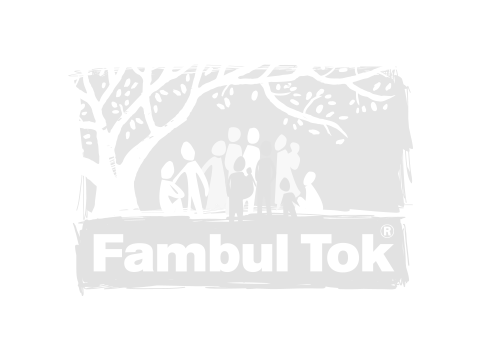There are occasional moments in this work when people, activities, resources, and timing all align, and there’s a powerful experience that grabs you in the pit of your stomach, leaving you feeling – This is what it is all for. Thursday, May 10th was one of those moments for me, with the workshop Fambul Tok held in Waterloo, just outside of Freetown (Sierra Leone), for a group of close to 60 ex-combatants.
Let me back up. Our able film team had been working nonstop (thank you, Henry Jacobson, Emma Tammi, and the team at Gigantic Studios!) editing a short (52 min.) version of the Fambul Tok film, to be used for educational and international broadcast purposes. The new edited version includes material from the film’s epilogue (which follows notorious rebel commander Captain Mohamed Savage’s return to the site of many of his atrocities, where he apologized and was forgiven on behalf of the community), so Savage and his story features prominently in this new cut. We finished the cut in record time, and we secured 3 excellent Krio translators to do a Krio voiceover version of the film, just in time for me to take it with me to Sierra Leone for my trip at the beginning of May. (Thank you, Aroun Rashid Deen, Fatmata Fornah, and Gibrilla Kargbo!)
The week I arrived in Sierra Leone, the CSO Platform on Nonviolent Elections (a UN-funded collaboration of over 70 Sierra Leonean civil society organizations working to prevent violence in the upcoming elections, which Fambul Tok is chairing), was kicking off their first official activities – a series of events in Waterloo, the area just outside of Freetown with the largest concentration of ex-combatants from the war (over 9000). The events included football (soccer) matches, a carnival, and radio programs, all preaching nonviolence. Fambul Tok and Campaign for Good Governance are the lead implementers of this programming in Waterloo, with Mohamed Savage taking the lead as the Fambul Tok representative coordinating the work on the ground. Yes, you read that right. Mohamed Savage, in the extraordinary continuation of his extraordinary journey from ex-combatant to peacemaker, is now on the Fambul Tok staff, and with the CSO Platform activities in Waterloo he has been working hard to be a leader in encouraging other ex-combatants to make the same journey.
The first events in Waterloo were a huge success – the opening football matches were well attended, and served as an opportunity to build bridges from the ex-combatants to other community members. Thrilled to be engaged in this way, there was a resounding call from many leaders of the ex-combatants for more, similar activities. The significance of this call isn’t to be underestimated. With national elections coming up at the end of this year, there have been several incidences of election-related violence already in Sierra Leone, and the pull on ex-combatants by various political forces to mobilize for new violence, in an attempt to influence the outcome of the election, is very strong. With the Krio version of the film in hand, John Caulker (Fambul Tok ED) thought the timing was right to have its first screening in Sierra Leone…for this very community of ex-combatants.
Together with Savage and other community and ex-combatant leaders, the vision for the day grew from a simple screening and discussion to a daylong workshop for 40 leaders, drawing from each of the 10 sub-communities in Waterloo – the first official direct engagement of the ex-combatants in the Fambul Tok process (and Fambul Tok’s first official work in Sierra Leone’s Western Area, which includes Freetown and its immediate surroundings).
Savage was very keen to have his story shared with other ex-combatants. He was eager to use his story as a platform to urge others to refrain from violence going forward, and to encourage other ex-combatants to acknowledge their wrongdoing in the war and apologize to those they wronged. John and I had no idea how the film and Fambul Tok in general would be received by the group, and frankly we anticipated that there could be a lot of resistance – or at the very least, an unwillingness to engage with the ideas of nonviolence and reconciliation in any depth. We couldn’t have been more wrong.
 Anticipating 40, as the workshop began in Waterloo, eager ex-combatant leaders kept appearing at the Winikon Plaza door until we had over 60 gathered for the event. With the newly released “Wan Fambul/One Family” CD playing as people gathered, each representative received with pride a copy of the Fambul Tok book, annual report, and the Wan Fambul CD, along with “Wi Na Wan Fambul” bracelets — which of course immediately went on everyone’s wrist. For the opening, John asked everyone to introduce themselves and say one thing they would like to learn that day. The responses set the tone for the day, illuminating the primal motivations drawing people to the meeting:
Anticipating 40, as the workshop began in Waterloo, eager ex-combatant leaders kept appearing at the Winikon Plaza door until we had over 60 gathered for the event. With the newly released “Wan Fambul/One Family” CD playing as people gathered, each representative received with pride a copy of the Fambul Tok book, annual report, and the Wan Fambul CD, along with “Wi Na Wan Fambul” bracelets — which of course immediately went on everyone’s wrist. For the opening, John asked everyone to introduce themselves and say one thing they would like to learn that day. The responses set the tone for the day, illuminating the primal motivations drawing people to the meeting:
“I want to be a good somebody in the community.”
“I want to get the skills to live in peace with our communities.”
“I want to get some skills to tell other ex-combatants how to live in peace with their community.”
“I want to help prepare [ex-combatants] to be changed people.”
“I want to acquire the skills to help build the country and my community.”
“I want to become united so we can create a better image.”
“I sell drugs. I do it because I haven’t had another way to be constructively engaged. I am looking to learn things that will help be constructive, so I won’t sell drugs anymore.”
“During the past elections, no one engaged ex-combatants. Doing it this time sends the signal that we can be peaceful, nonviolent.”
These responses immediately dispelled any doubts we had about whether this group was interested in refraining from violence, and living in peace with each other and their community! After an initial discussion of the term “ex-combatant,” and the advantages and disadvantages that came from being saddled with that term as their collective identity, we settled in to watch the Krio version of the film.
In all honesty – my stomach was fluttering during the screening. Sitting next to Mohamed Savage, watching 60 other ex-combatants watch his story unfold, in the context of this great national story of communities and individuals courageously and graciously dealing with the horrible wounds of the war – it was hard not to be amazed that I was actually in this place, in this moment. With all of us together, watching Savage’s face transform on the screen, watching him embrace the mission of reconciling with his community – I was vividly aware of the moment Sara (Terry, Director/ Producer of the film) first called me after that interview took place, describing the extraordinary transformation she had just witnessed (and they had just captured on film, thanks to an alert crew!), and the stroke of inspiration that had led her to show Savage Naomi Joe’s poignant appeal to her brother to return home. (If you’re not familiar with this moment – watch the film!) Thinking back to that moment, and thinking back to the start of the program – could I ever have imagined it leading…here? To this? Never in a million years! I was very conscious of all the interweaving moments, interwoven lives and stories, that had led to just this moment – of all of the individuals, working to live their lives to their highest and best purpose. The Bigger Hand, indeed.
Many ex-combatants were sobbing during the screening. Several were so moved, they had to get up and leave, unable to continue watching. But the most extraordinary moment was after the screening when Mohamed Savage stood up to speak. With singular focus and an eloquence born from the obvious, raw honesty behind it, he urged his fellow ex-combatants to change their ways. He urged them all to acknowledge the wrong they had done during the war, and to apologize and reconcile – with themselves and with the communities they had wronged. He urged them to commit to never turn to violence again. He talked about the resistance they would face in that process – that their friends and acquaintances wouldn’t immediately accept that they had changed, and that they would have to be patient and persistent in going forward anyway. He spoke about how, in going back to apologize, he had done what he had done not only for himself, and for his community, — but for them, to be an example to them, and to help them to do the same thing.
John asked the group what they thought about the film and Savage’s story, and how many of them might want to follow Savage’s example and reconcile with the communities they had hurt. Every single person in the room raised their hand. Every. Single. Person.
Smaller group conversations yielded more insights into the film’s impact on this audience. Several noted that it illuminated for them how “senseless and wicked” the war had been, and watching it caused them to regret strongly what they had done. Many said it was the first time they realized the pain they had caused others in the war. They also acknowledged that, in the reconciliation process they wanted to embark on, their first task would be to prepare “inwardly” to apologize – they knew it would take work for them to be honestly, emotionally ready to apologize. They wanted to embrace this work as their next task.
In contemplating the way forward, there was a clear recognition that many had fought in the war because they had been manipulated by politicians, or by others in senior positions. There was a clear and strong commitment going forward, above all, not to be manipulated by politicians. Rejecting the former slogan “A dae wit you” (I am with you) that had been repeated as emblematic of their loyalty to those above them, there was a strong and countervailing commitment to organize now for good, for self improvement and community improvement.
To lay the framework for the new opportunity this group wanted to claim, they decided at the workshop that they no longer wanted their identity to be defined by events from the past, and especially by their actions in the war. They wanted to choose a new term to define their group identity – a term that expressed what they wanted to be in their communities going forward. A lively discussion ensued, and it was finally agreed – they would adopt the term “Peace Parents” to describe themselves from now on. There was a clear sense that they wanted to be leaders in bringing peace in their communities going forward, and they recognized that that wouldn’t be the work of a day. But rather, like parenting, it would take long term commitment and careful tending and nurturing, to help forward peace.
Together, they decided on the criteria for Peace Parents – including committing to no violence, and no violent communication; reconciling with your people; and being productively engaged in your communities and providing community service.
John summed up the day by saying how much he had learned – namely, that ex-combatants were not bad people. But simply people that needed another opportunity.
As extraordinary as the day was, I was aware at the time, and am even more aware now – that it is only a beginning. Much hard work remains ahead, and where it will lead is still uncertain. This will be, in essence, a 6th district for Fambul Tok’s work, and it is coming at a time when the organization’s resources are already stretched too thin to be able to meet the pre-existing demands. But the wheels are in motion, and the momentum is strong. And riding the Fambul Tok train has always been an adventure, so why should it change now?!
[For an up close look at the photos in this blog, see the album on our Facebook page.]















